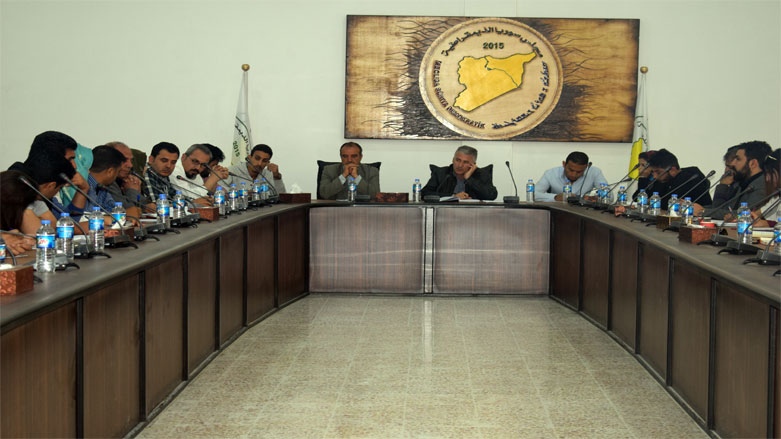Kurdish-backed council rejects Russian fears over Kurdish 'quasi-states'

ERBIL (Kurdistan 24) – The Kurdish-backed Syrian Democratic Council (SDC) has called on Russia to focus on ending crimes by Turkish-backed groups in Afrin, rather than expressing worries that the Syrian Kurds would create a “quasi-state” on the east of the Euphrates.
On Monday, Russian Presidential spokesperson Dmitry Peskov said Moscow is against US-backed “quasi-state” formations.
“We are absolutely against all measures on the territory of Syria that could lead to an emergence of ‘quasi-state’ formations, which could subsequently damage the territorial integrity of Syria,” Peskov said, speaking at the Moscow State Institute of International Relations.
Meanwhile, Russian Foreign Minister Sergey Lavrov said in an interview with Rossiya 1 TVon Sunday that the activity “on the eastern bank of the Euphrates River clearly violates the commitment to Syria’s territorial integrity.”
The Russian FM also claimed the United States was pretending that its steps in the east of the Euphrates are temporary, where America has commandos and advisors that are “playing the Kurdish card.”
“This is a very dangerous game, taking into account that the Kurdish issue is vital in a whole number of regional states [in Syria, Iraq, Iran, and Turkey],” he said.
According to Lavrov, the West does not have an alternative strategy regarding Syria.
“The US is trying to establish quasi-state structures, they earmark hundreds of millions of dollars into rebuilding these areas, so that people could return to a normal peaceful life, but they refuse to restore infrastructure on the territories, which are controlled by the Syrian government,” he said.
The SDC described Lavrov’s statement as “suspicious and disturbing,” and said the Kurdish issue should be resolved and must be dealt with constitutionally within the unity of Syria.
“Therefore, we reject such declarations, which only contribute to unrest and instability of the region, which has maintained the civil peace, the lives of citizens, and fought terrorism and defeated ISIS [the Islamic State] in its strongholds,” the SDC said.
“We affirm the independence of our decision and our free Syrian national will and our complete refusal to involve us in the policies of the axes [superpowers], considering us as an instrument for provocation and extortion.”
When Turkey attacked Afrin in January 2018, Russia approved the Turkish operations. Moreover, on Sept. 17, Russia and Turkey reached a deal on Idlib, although Damascus opposes the Turkish presence.
The SDC called on “the Russian Government to pay attention to the devastating consequences of the Russian-Turkish agreement about Afrin,” and to end “crimes against humanity committed by the Turkish occupiers and its terrorist partners against Afrin and its locals.”
Nicholas A. Heras, a Fellow at the Center for a New American Security, told Kurdistan 24 that Turkey’s desire to eliminate the Syrian Democratic Forces (SDF) “undermines the US position in Syria.”
“Russia wants the United States out of Syria more than it wants Turkey to leave Syria,” Heras stated.
According to Thomas Schmidinger, an Austrian expert on Kurds, Russia is displeased with the “real functioning alternative to the Syrian regime” in Syria’s northeast, noting that Syrian Kurdistan “is the existing alternative to the regime.”
Schmidinger suggested that if Russia got rid of the Americans, it would pave the way for the Syrian regime to squash the Kurds’ desire for autonomy and make it easier to defeat pro-Turkish forces.
“This territory is now the largest with the most natural resources—the oil wells,” he concluded.
The SDC called on Russia to seek a political solution rather than support Turkey and undermine the Kurds.
“We stress on the necessity of our participation in the political process as our right to end the crisis in Syria and fix the security, stability, and unity of the country,” the SDC said.
Editing by Karzan Sulaivany
